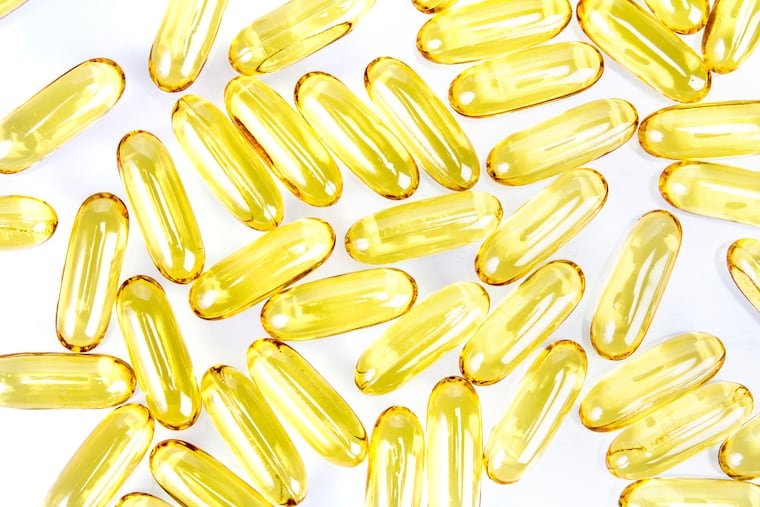Can Vitamin D prevent COVID-19? The pros and cons of supplements used to treat and prevent diseases
A local cardiologist ranks nutraceutical in order of proven effectiveness, from most to least effective, for preventing COVID-19 and heart disease.

Vitamin D is a nutraceutical that may have a role in preventing COVID-19, though the scientific jury is still out. But as with other over-the-counter supplements, many of my patients feel there is no risk in trying it.
A nutraceutical is a food-based substance that can be used to help treat disease or prevent it. But nutraceuticals do not undergo the rigorous testing applied to pharmaceuticals, which are prescribed after results of clinical trials show that they are effective to treat particular diseases, and the U.S. Food and Drug Administration approves their use.
The global market for nutraceutical products, which are not regulated by the FDA, is estimated to be more than $30 billion annually, and is growing 8% a year. The majority of these products include vitamins, botanicals, minerals, fiber, and fish oil.
Do they work? There is evidence that many do, and we’ll discuss the pros and cons of various supplements used to treat and prevent heart disease and COVID-19.
Cardiac-based nutraceuticals include red yeast rice, fish oil, coenzyme Q10, garlic, vitamins C, D, E, and B, niacin, resveratrol, and calcium.
I will rank them in order of proven effectiveness, from most to least effective, with some of this information coming from a recent review in the Journal of the American College of Cardiology.
Most effective
Vitamin D supplements may have a role in preventing heart disease. The problem is that observational studies show that low blood levels of Vitamin D are associated with elevated cardiac risk, but randomized trials do not show taking a supplement lowers risk.
Vitamin D, best taken in the form of D3, also is being investigated for its potential in fighting COVID-19, especially for those whose blood level suggests deficiency. Trials looking into preventing COVID-19 have led to conflicting results; however, a recent trial published in the Journal of the American Medical Association did not support the use of a high dose of vitamin D3 for treatment of moderate to severe COVID-19 in hospitalized patients.
The bottom line: Get a blood test and consider supplementing Vitamin D if your level is low. This can help guide the proper dose to take, usually from 1,000 to 5,000 units a day.
Red yeast rice, the result of the fermentation of yeast and rice, is the most effective cholesterol lowering nutraceutical. There is no evidence that it helps prevent COVID-19.
There are several caveats. Never take red yeast rice with a statin, as they have similar mechanisms of action. Because they are not FDA approved, like all nutraceuticals, quality may vary. Citrinin, a potential cause of kidney cancer, can be found in some products not certified as citrinin free.
Red yeast rice, in addition to a healthy lifestyle, can be a good idea for someone who has a low to intermediate risk of developing heart disease, especially for those who cannot take a statin because of such side effects as muscle aches. It should not be taken if you have had bypass surgery or a coronary stent, as statins are better therapy. Discuss its use with your doctor.
Coenzyme Q10 is a natural compound that improves cell function. When you take a statin for high cholesterol, CoQ10 levels go down. Taking a supplement of 100-200 mg/day can help some people with statin-induced muscle pain. It may also have a role in helping heart failure, but this is more controversial. There is not much downside to trying CoQ10 if you ache from taking a statin. One study did suggest a decreased risk of hospitalization from COVID-19 with taking CoQ10.
Less effective
Fish oil is a popular supplement, but whether it really helps the heart is an ongoing question. If you have a high triglyceride level, are already on a statin, and either have coronary disease or have multiple risk factors, taking Vascepa is a good idea. It is a prescription brand of fish oil composed of the omega-3 fatty acid containing pure EPA, and as a prescription product is technically more a drug than a nutraceutical. Other fish oils have never been proven to lower cardiac risk. If you want to take fish oil, unless your triglycerides are high, it should be for non-cardiac reasons such as arthritis or brain health. Possible beneficial effects to prevent COVID-19 are also controversial.
Possibly harmful
Niacin, which is Vitamin B3, will lower cholesterol, lower triglycerides, and raise HDL (good cholesterol). But in the doses needed to do this, which is more than 500 mg per day, it can cause flushing and liver problems, and raise blood sugar. Studies have shown that niacin should never be taken with a statin, as the combination can be dangerous. Taking it will not help prevent COVID-19.
Calcium supplements usually are taken for bone health, but several studies have implicated these supplements with cardiac risks. As more than 40% of Americans take calcium supplements, the possibly negative effect on the heart needs to be considered.
Neutral
There is not good information regarding positive cardiac or COVID-19 effects of other nutraceuticals such as Vitamins E and C, garlic, resveratrol, or even multivitamins. Negative effects are unlikely. They may have beneficial effects other than on your heart, but you may be better off spending your money elsewhere. Following a plant-based diet with lots of fruits and vegetables is probably a better path than taking most of these nutraceuticals.
David Becker is a board-certified cardiologist with Chestnut Hill Temple Cardiology in Flourtown. He has been in practice for more than 25 years.